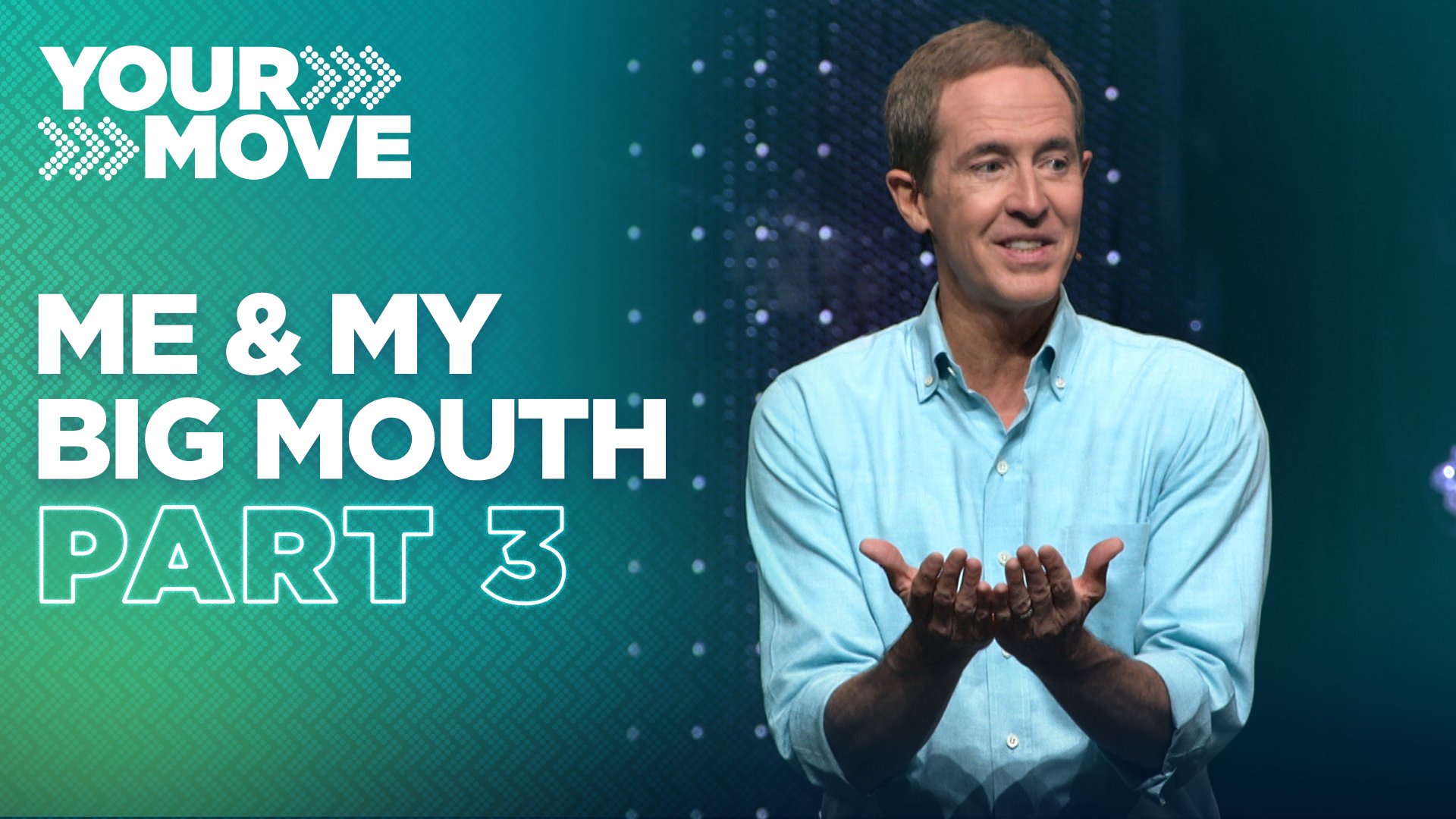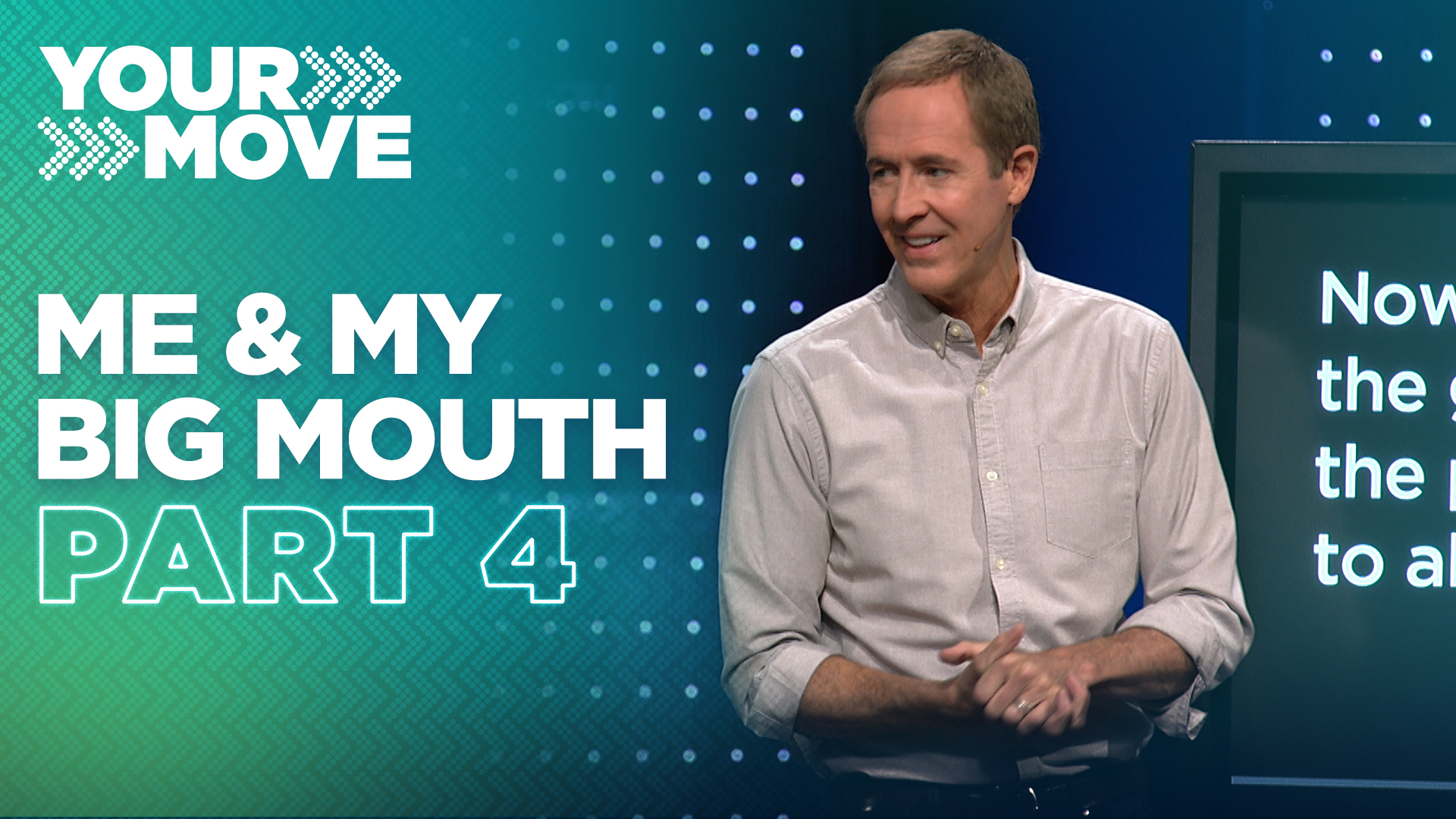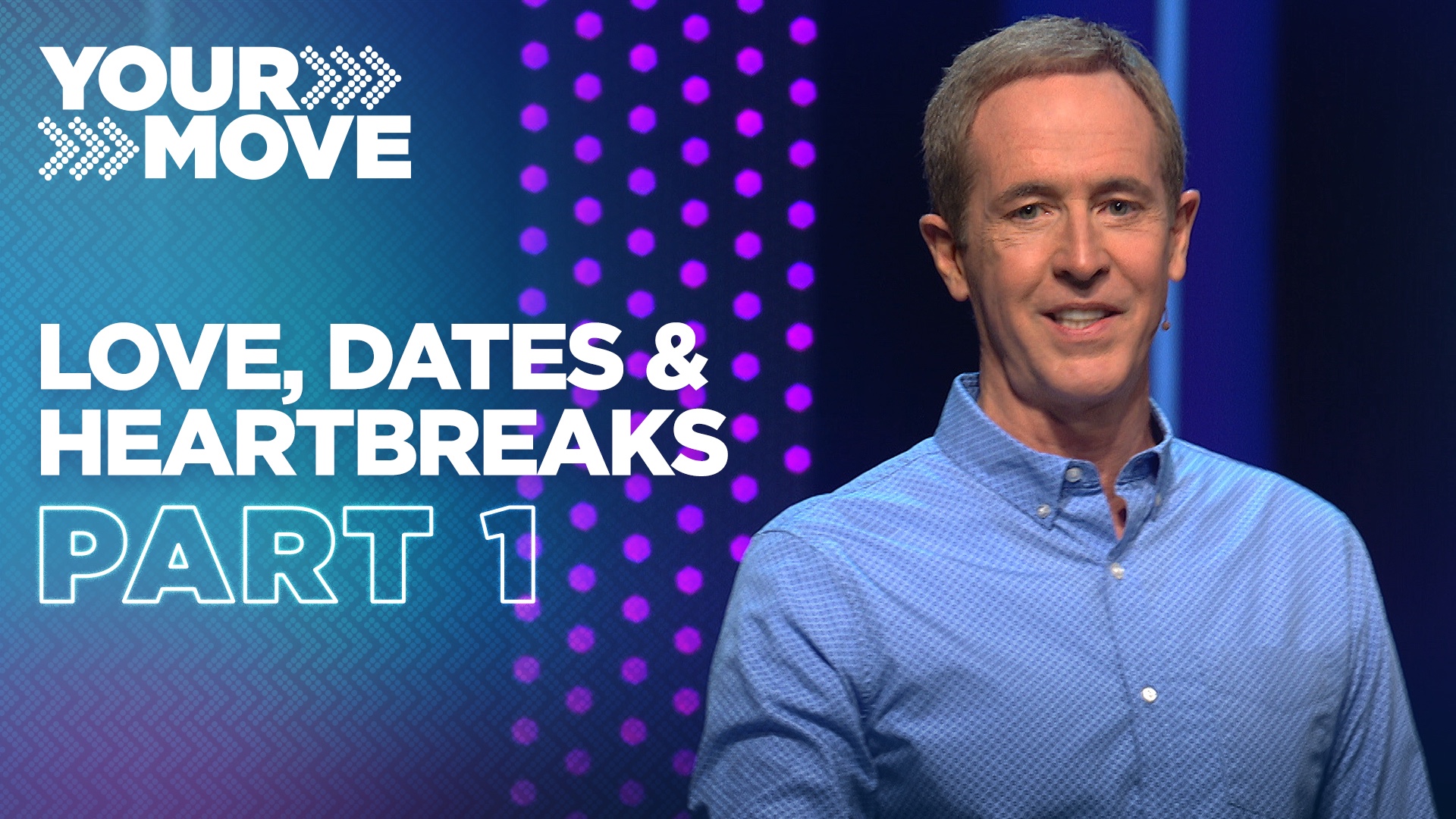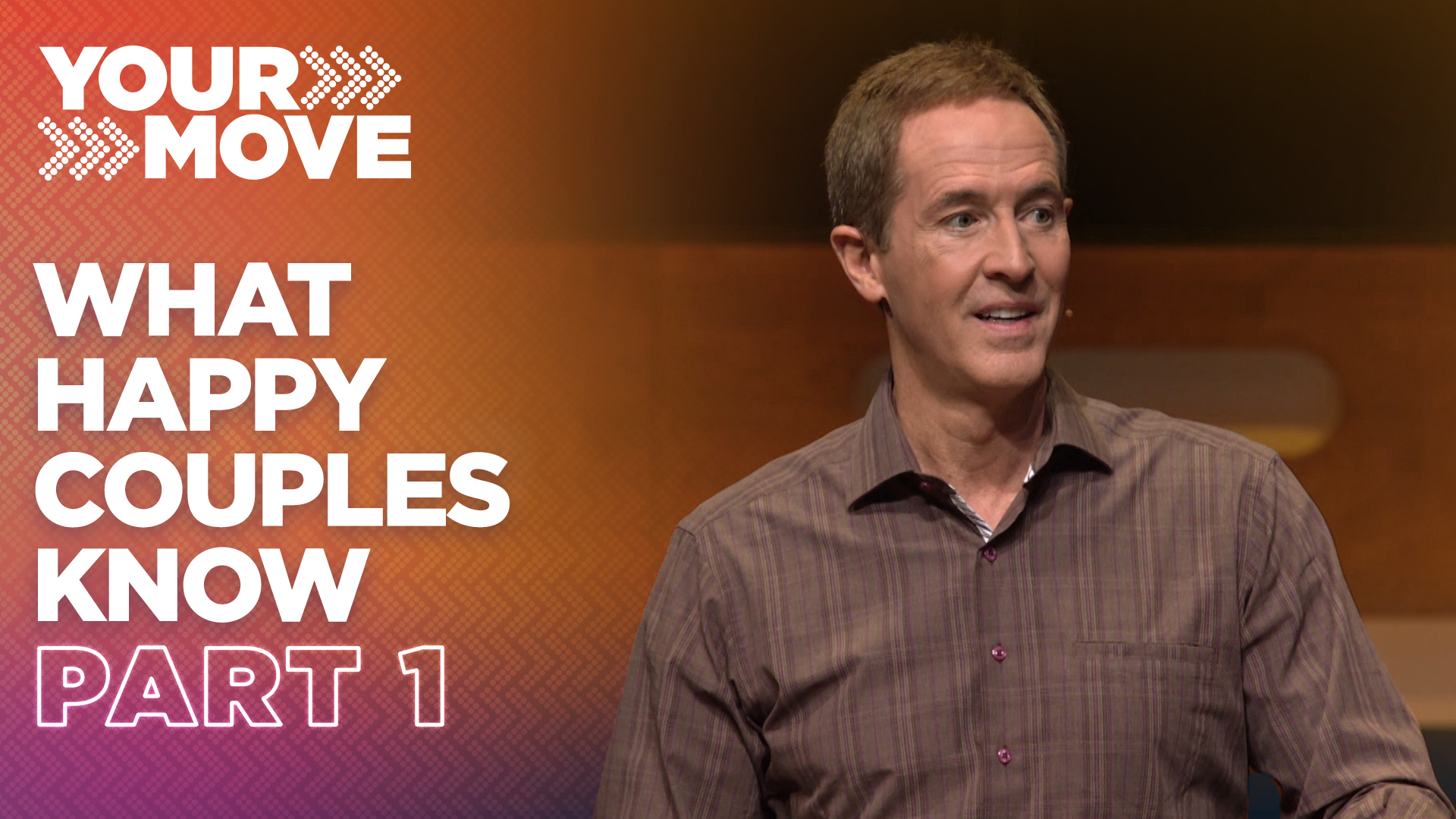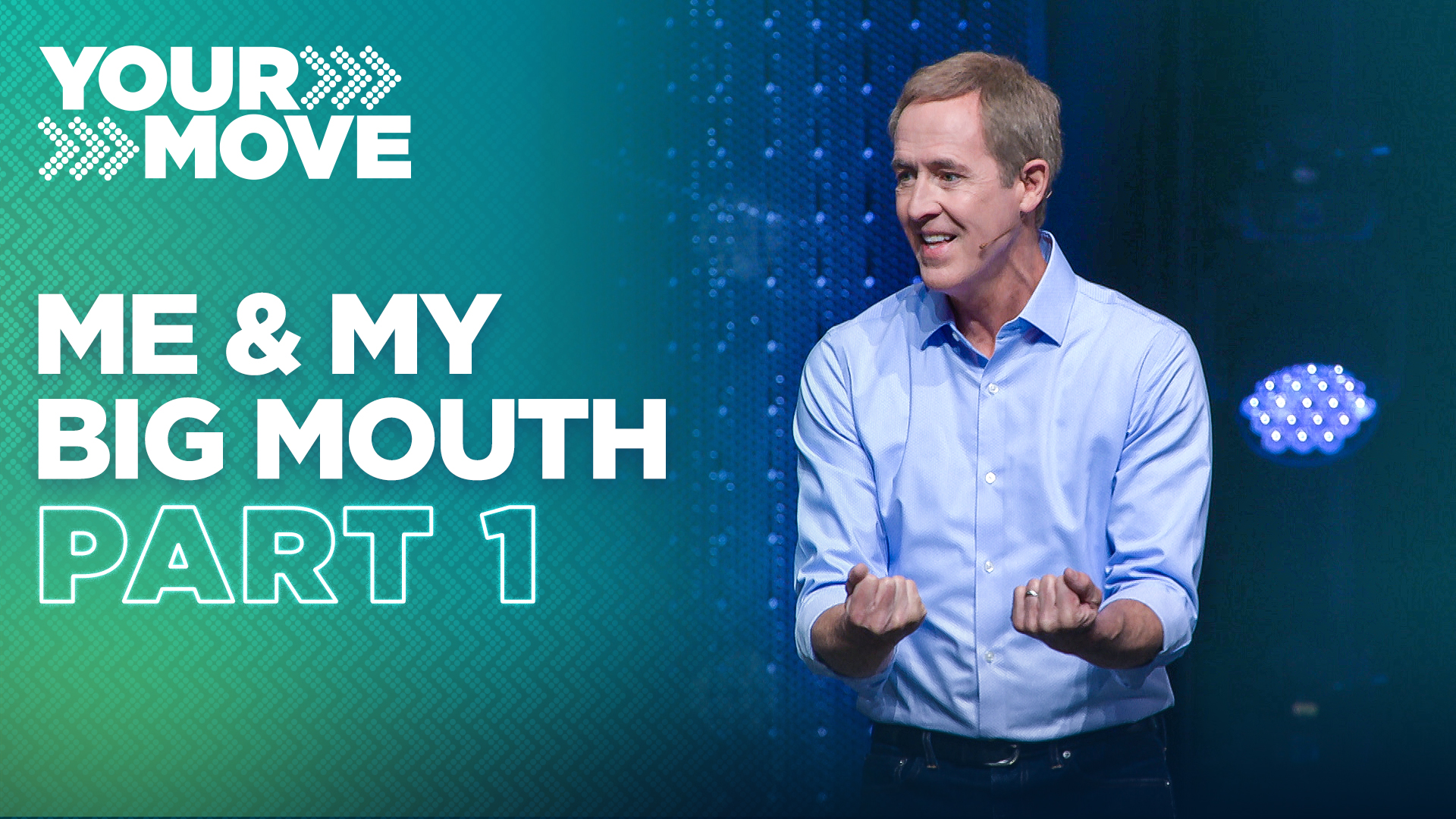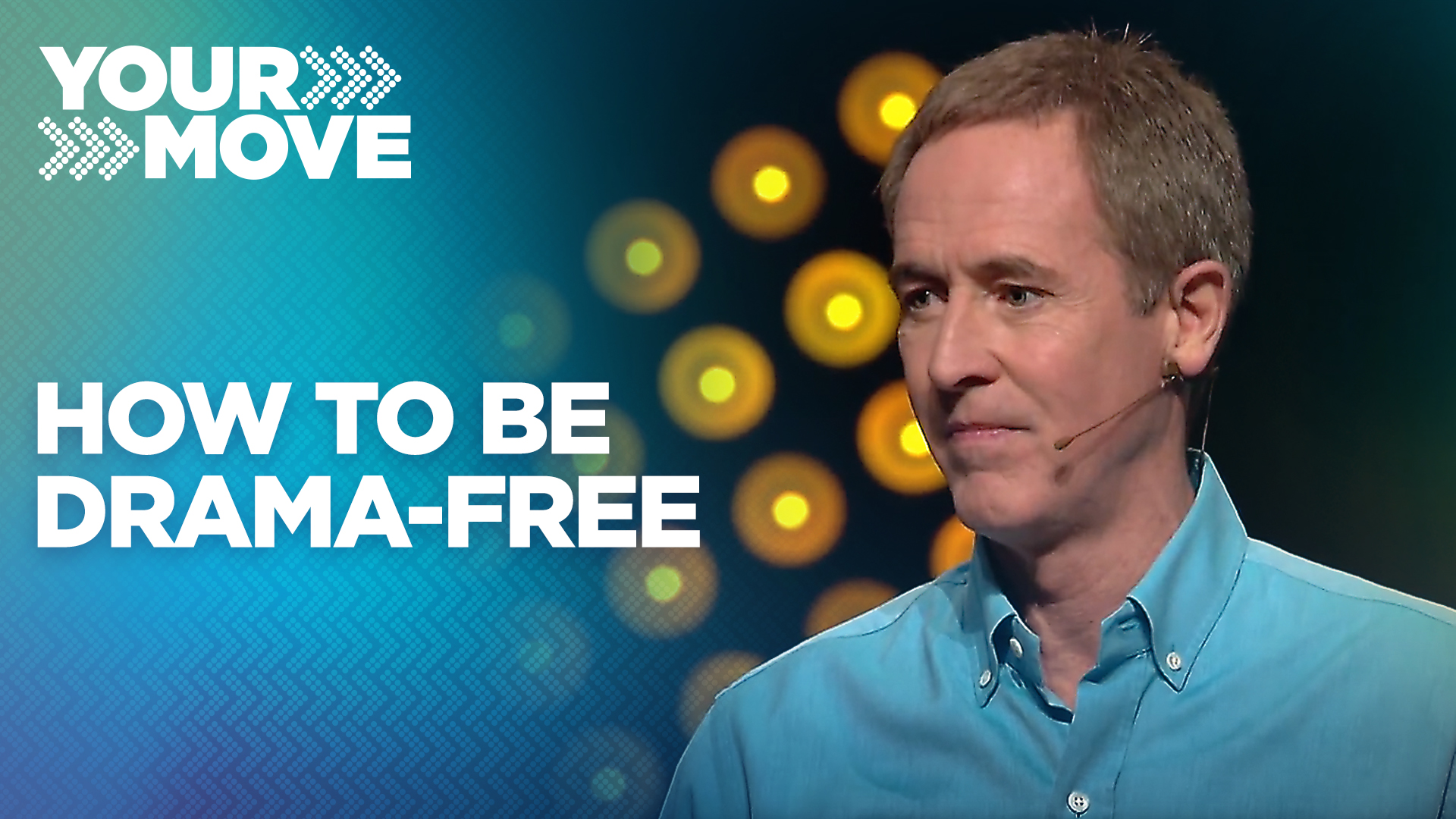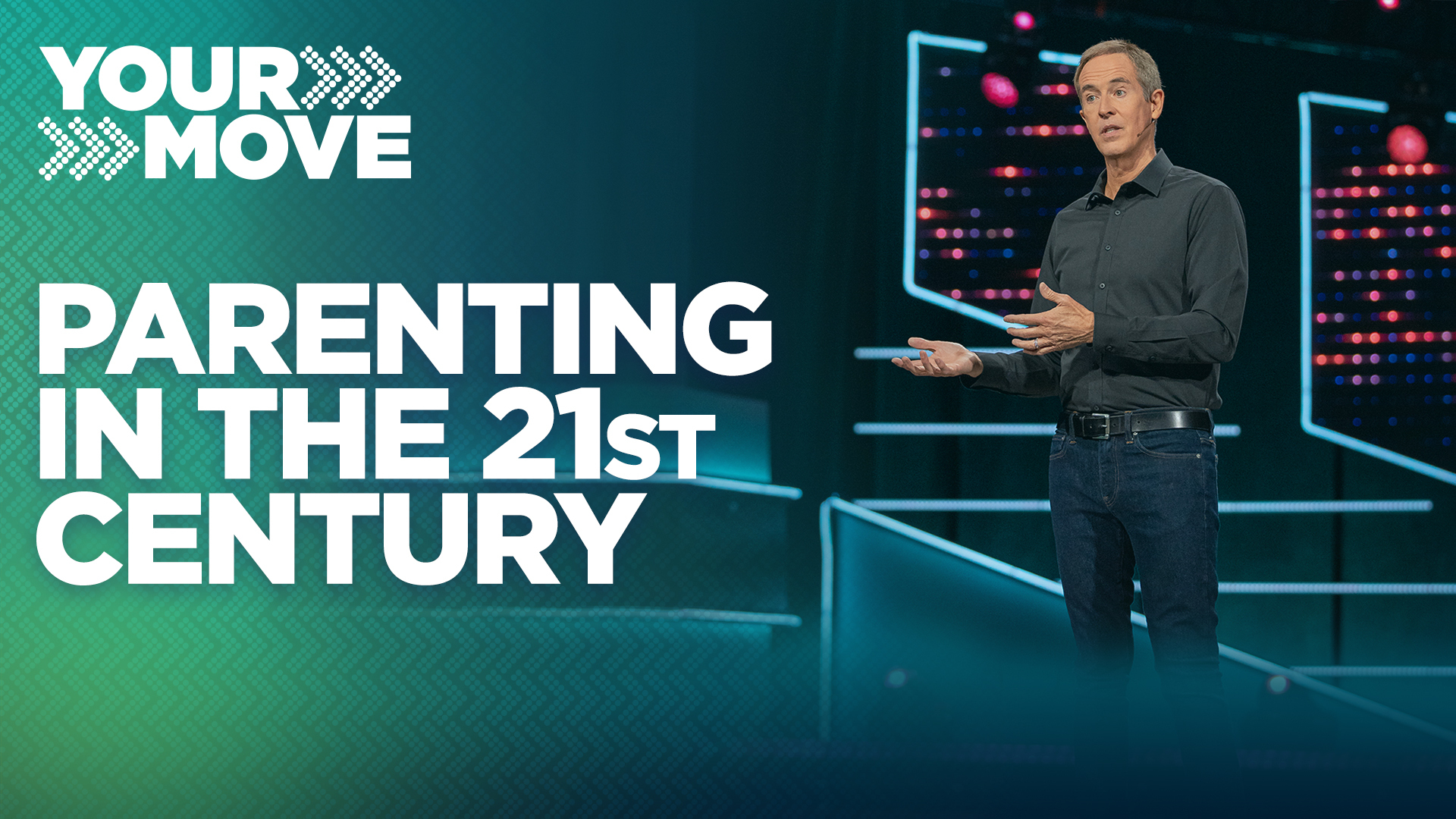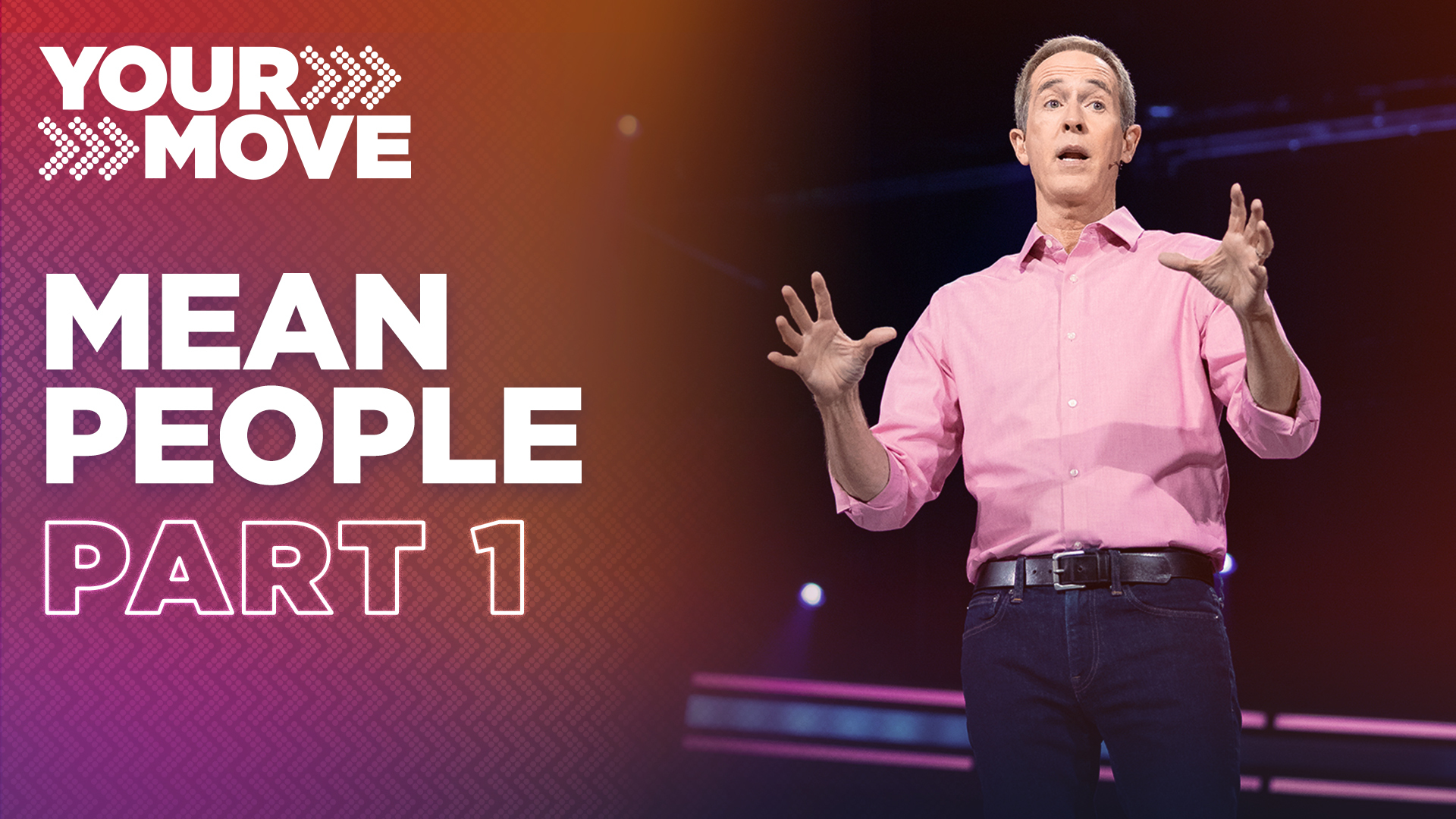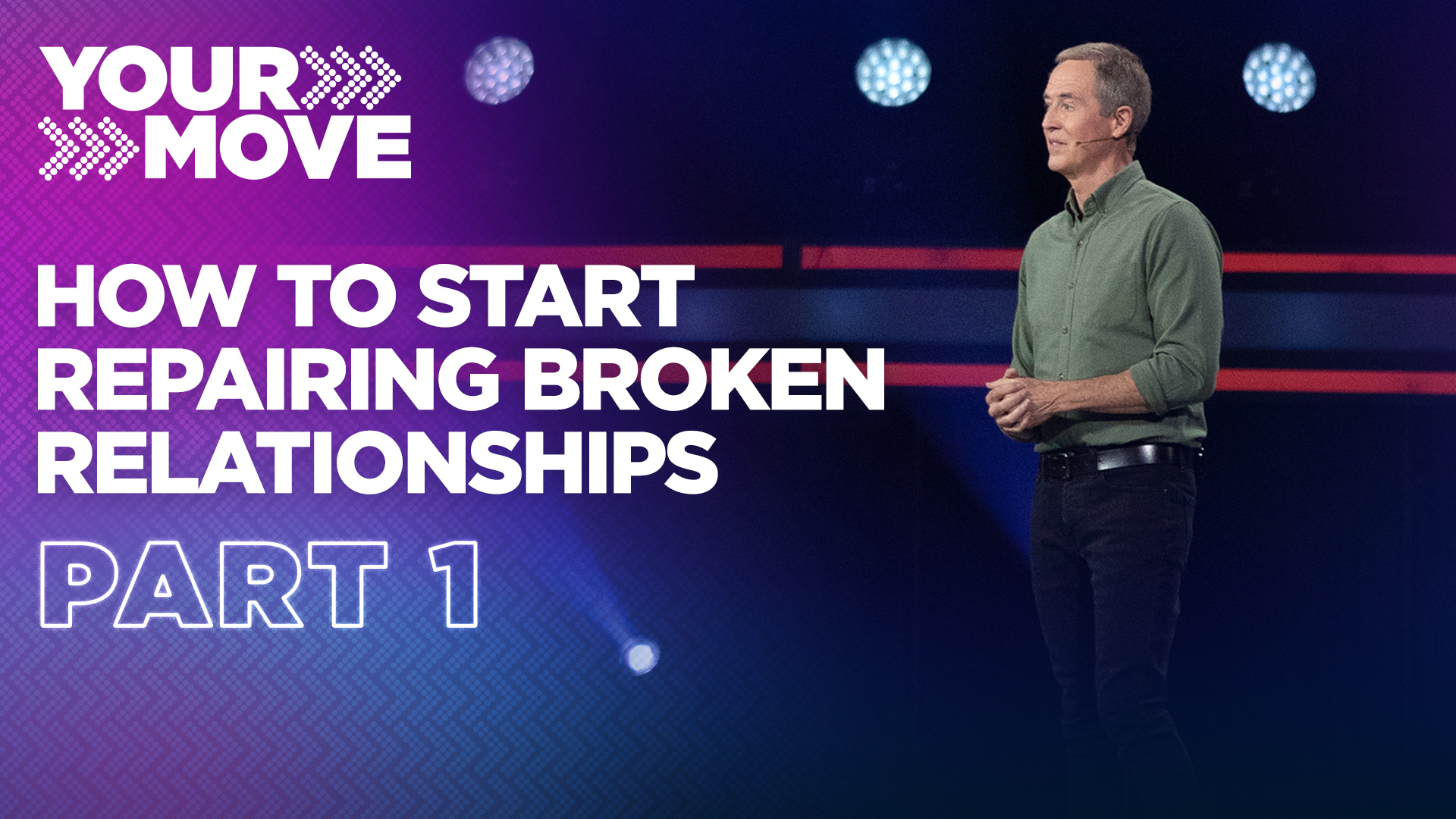With just a few words, you can build someone up or tear them down. But how do you keep that in mind when holding your tongue is the last thing you want to do?
- Think of a time when someone famously lost control of their mouth. How did this impact your perception of them?
- Who has significantly impacted your life with their words? Were the words that shaped you positive or negative?
- Andy mentioned that it’s easier to remember the harsh words of those who hurt us rather than the kind words of those who encouraged us. Why do you think this is?
- In which relationship do you most often find yourself struggling to hold your tongue? Have you faced any relational consequences as a result?
- What’s the most challenging aspect of being “quick to listen and slow to speak”?
NOTE: The following content is a raw transcript and has not been edited for grammar, punctuation, or word usage.
So, guys, have you ever asked a woman when she’s due…
[laughter]
and she wasn’t?
[laughter]
I think the average guy does this on average, just one time.
[laughter]
Unfortunately, I am above average.
[laughter]
We all have those moments. Because the problem is once our words are out there, once the words are out there, they’re just out there and the good news is God gave us all this button, but what we really needed was this button, right? We can all hit pause, like I’m just, I can’t, but the rewind button is what we all need. So to get all caught up… we have to review and it goes like this. Quick to listen, slow to speak. Quick to listen, slow to speak.
Everybody altogether even if you’re driving, ready? Here we go. “Quick to listen, slow to speak”, “quick to listen, slow to speak”. You want the same thing they do you wanna be heard and you want to be understood.
So, picking up where we left off last week. As you know, words are powerful, words are extraordinarily powerful. In fact, your life has been shaped, your life has been shaped, my life has be shaped. We have all of our lives have been shaped by the words that were spoken to us the words that were spoken over us, and the words that were spoken about us. Words shaped our childhood experiences words are shaping your marriages and your most intimate relationships, words impact your confidence, your self-confidence, words impact who you see when you look in the mirror. People with no confidence had gained confidence simply through words spoken over them. And people with extraordinary confidence have lost confidence because of words spoken to them. And the thing that makes this so fascinating and so difficult and so challenging is that the words, the words that we receive and the words that we speak are not equally weighted, are they? In fact, how many more positives does it take to counter one negative? I don’t even know what the number is, there are actually some statistics, but it depends on what is said. When you hear a negative one simple positive doesn’t counter the negative because words are not equally weighted. We never forget or we rarely forget hurtful words, it just sticks in us, it sticks in our hearts. We just remember the hurtful words, at the same time we rarely remember encouraging words.
In fact, some of you can remember that at some point in your past, your mom or your dad or a grandparent or a mentor, sat you down and said, “Now son or honey or sweetheart or friend,” they looked at you, they said, “What I’m about to say is so important, never forget.” And you remember that somebody had to never forget conversation with you at some point in the past, you do not remember what came after that part. You just remember, “Oh yeah, I remember my dad would tell me this is important and I forgot.” But those, the hurtful words, the criticism, the sarcasm, we just remember and the words aren’t equally weighted. It takes a whole lot more positive words many, many more positive words to counter a single negative content. And not only are the words not weighted the same, the source isn’t equally weighted. See, I’m a boss. My words weigh 150 pounds. In fact every once in a while my administrative assistant Diane I’ll be ready to march down the hall to go talk to somebody she’ll say, “Andy let me talk to them. My words only weigh 20 pounds. Your words weigh 120 pounds.” If you’re a mom, you’re words way 500 pounds, right? If you’re a dad I don’t know why this is the case, our words weigh the most.
About two weeks ago, Sandra and I have a dear friend, family friend who we’ve known since she was born actually and she’s from 18 to about 23, she had a really, really, really hard and dark time. Now, she’s in her late 20s and she’s battling her way out of it, she’s doing so great. She went back to college, she’s finishing school, she’s a single mom, she’s just working so hard and she, her life is turning around and it’s just because of her tenacity and her discipline. So I got the phone and I was on the phone with her, I just was telling… She lives in a different city. I was just encouraging her. I said, “Just think about where you were three years ago, think how far you’ve come. So Sandra and I are so proud of you.” I was just being encouraging and when I finished, there was silence. Here’s what she said, “I wish my dad would tell me that. I wish my dad would tell me that. Thank you Andy, But your words don’t weigh as much as my dad’s, I would love to hear my dad say what you just said, his words weigh the most.” And perhaps the most overlooked part of this dynamic is that the recovery time isn’t the same either, recovery time isn’t equally weighed, right? The hurt when you hear if somebody says something hurtful to you, it hurts immediately, but recovery takes time. In fact, no amount of words, to the contrary, no amount of words to the contrary, create immediate healing or recovery.
And this is why it’s so ridiculous when we say, “But I said I’m sorry, I said I’m sorry, I said I’m sorry, right? I said I’m sorry.” The implication is, “Why aren’t you fine now? Why aren’t you fine now? Why aren’t we back? Why aren’t we back to where we were before I said what I said? I said something stupid. You got your feelings hurt. You called me on it, I said, I’m sorry. So I, aren’t we back to even”? Well, for the same reason that if I accidentally slam your hand in my car door and then I open my car door and you pull out your mangled fingers and I say, “I’m so sorry, it was an accident.” Well, think we’re not back to… We’re not equal again, you’re not whole again, we still have to go to the emergency room because I’m sorry does not reduce the need for a trip to the ER, right? And the same is true for our words. Our words hurt and more words don’t immediately make things better. They are not equally weighted.
So, “quick to listen, slow to speak, quick to listen, slow to speak, quick to listen, slow to speak”. Our words are the most powerful thing we have. You can do more damage with your words than you can with any other part of your body, or any other thing you have control over, you can destroy… Think of it, you can destroy a person with words and not even be in the same room with them.
Now, James, the brother of Jesus, that we began with last week, and the whole idea of James brother of Jesus is still mind-boggling. James brother of Jesus writes a letter to the first century Christians and he has a lot to say about the power of words. In fact, your greatest regret relationally, I’m guessing your greatest regret, relationally, might have been avoided if you had taken heed through these extraordinary words, these words that are free, these words that are everywhere, these words that sat on your grand mama’s coffee table, your parents coffee table, you’ve got them in your pocket, they’re all over the internet, these words are everywhere. If you had simply embraced these simple words we’re about to look at, you might have avoided your greatest relational regret. And if you will, listen, and if you will take heed and if you will lean in, who knows how many future relational regrets you might be able to avoid because these words are so powerful.
Now, if you’re not a Christian or a religious person, that’s okay, this is for everybody. And when James wrote these words, he had Christians in mind, but you’re about to be introduced to some extraordinary, extraordinary insight and I just want you to keep in mind this isn’t the New Testament and these words were pinned by James the brother of Jesus. In fact, if you’ve never read the Bible before, and you thinking, “I don’t know that I ever wanna read the whole Bible, but if I was gonna read a little bit of it where should I start? You should to just find a New Testament document or we call it the Book of James, and start there. It’s extraordinarily practical. And then when you think about 2,000 years ago, this guy had this wisdom, it’s quite remarkable.
So, here’s how he begins. In fact, his first statement [chuckle] if you’ve ever said the Bible isn’t true, you’re not completely correct, because this next statement this first statement is absolutely true. You can’t argue with this. Here’s how he begins, the discussion, he says, “We all stumble in many ways.” And in Baptist church I got an “Amen” because that’s absolutely the case. We all stumble in many ways, but listen to this, this next statement is kind of the thesis for everything that follows, is so insightful. He says, “Anyone,” that’ll be all of us, “Anyone who is never at fault in what they say is perfect.” We all stumble in lots of ways, but anybody who gets control with her mouth is perfect, they’re able to keep… What do you mean by perfect? He tells us they’re able to keep their entire body and check. In other words, gain control of your mouth, gain control of your words and you will keep your entire body out of trouble. That’s how powerful your words are. To which we’d say, “James can give us a little evidence?” He says, “Let me illustrate it for you.” First illustration, something from his world. “We,” he would say, “When we put bits into the mouths of horses,” I don’t know if you’ve ever done this. I’ve done this a couple of times when I was younger. Not the easiest thing to do sometimes, “When we put bits into the mouth of horses,” this is his world. He says, “To make them obey us, we can turn the whole animal.”
He says, “If you get control of the mouth of the horse, you can control the entire animal.” Now, you may have nieces or younger sisters or have younger brothers but probably girls in your family or maybe a daughter like us, and if you’ve ever seen a little itty bitty girl, ride a big whole horse is that just not the weirdest thing in the world when Ally wanted to ride horses and it wasn’t my favorite thing for her to do but she wanted to ride horses. so I show up four or five lessons in and there’s my little daughter, and she’s on top of this elephant horse and the trainer is walking her around the ring, she says, “Watch this daddy.” And the trainer hands Ally the reins and steps back and my little daughter is on this mammoth guiding his horse around, why? Because you control the mouth, you control the entire beast, and that’s James point. He says, “Okay, you don’t like that illustration? Let’s talk about boats.”
Or he says, “Take ships as an example,” not our ships, first, second century ships. Although he says “They are so large” and ships back in this day some of the largest things that humans were able to make other than building buildings. “Although they are so large, and are driven by strong winds, which are completely unpredictable, they are steered by a very small rudder wherever the pilot wants to go”. Here’s a picture of an ancient merchant ship, not a picture, but a drawing. They didn’t have pictures obviously back then. And look, giant sailed as a whole about 200 people, and tons of cargo. And it again, you never know which way the winds are gonna go and the weather’s unpredictable he says, “But regardless of that, this little itty bitty rudder is able to influence the direction and the destination of this entire ship.” His point is obvious. Small part, big influence. Small part, big influence. And so he says, “A rudder or a bridle in the mouth of a horse is insignificantly proportionally.” Look at the size of all the different parts. It’s insignificantly proportionally, but has extraordinary, extraordinary influence in terms of the direction of the beast, the direction of the ship or as he’s gonna argue the direction of your life, the direction of my life.
“Likewise,” he says. Likewise just like the rudder, just like the bit in the mouth of a horse. Likewise, the tongue. Now just think for a minute, this is gross, but I don’t want you to miss the power of what he’s saying. Think about the size of your tongue, compared to the rest of your body. To begin with this, about the ugliest part of your body. It’s the part, nobody wants to see. And it’s only about four inches long and yet it has the power to control your destiny. In fact, that the tongue is made up of about eight muscles, and this is interesting, this should not be a surprise. The eight muscles, and your tongue never get tired. They never wear out, they are never exhausted.
[laughter]
Is anyone surprised by that? No, the rest of your muscles, you can wear them out, not that tongue, and never ever, ever wears out. So James says, “Likewise the tongue even though it is a small part of the body, it makes great boasts. It has extraordinary influence and power.” “Consider,” he says, “Think about this, consider what a great forest is set on fire by a small spark.” Something so small. Don’t laugh. You have same problem at home with these things, don’t you?
[laughter]
I mean does anybody get it to light the first click? No, okay, oops, there you go. Something so small, something so small, something so vast, something so small, something so vast. There is no logical correlation. None. He says this. Okay, just keep your focus on this. The tongue, our mouth, your words. “The tongue also is a fire, a world of evil among the parts of the body.” That your tongue, your mouth, your words, has the potential for endless evil. Now as we gonna see next week, don’t miss next week. Next week… “It also has the potential for endless good but he’s focused on the negative.” It has potential for endless evil. Every kind… Think about it, every kind of evil can be… Every kind of evil can be initiated by the mouth, by words, by the tongue. A divorce can be initiated by what you say. Murder can be initiated because of an argument. Wars have been started over words. And we are all born with our pilot lights lit. He says it gets worse. “The mouth, the tongue, words, it actually has the power to corrupt the entire body.” Your tongue. We all have a story. It doesn’t take long for those to come to mind. We all have an illustration of how our mouth didn’t just get your mouth in trouble, it got your entire body in trouble, right?
Parents, when your child mouths off, do you put the mouth and time out or do you put the whole body and time out, right? If you have teenagers and they mouth off, you don’t ground the mouth, you ground the entire teenager. No one’s ever divorced a mouth, you divorce the entire person. That’s James’s point. That word your mouth has the potential to get the entire body because your mouth, your words determines the direction, the direction, the destination of your entire body, your entire life. He says it has the potential going back to the fire imagery to set the course of one’s entire life on fire, the whole course of your life as your words go, so goes your life. As your words go, so goes your relationship. And you have the potential, I have the potential to burn down a relationship with my words. Burn down my marriage with my words, burn down my relationship with my kids and my friends with my words. Burn down my career, burn down my future with my words. And the truth is, it’s a little bit convicting. Some of us have scorched the people we love the most with our words. Our kids, why would we scorch our kids with our sarcasm? The people that we’d asked to spend the rest of our lives with us to scorch them with our sarcasm, or words.
Then [chuckle] when we’re confronted how do we respond? We defend ourselves. And what do we defend ourselves with? More words. “Well, I was just being honest. Well, I was just mad. Well, I was drunk. Well, I didn’t mean it.” But the truth is, and you know this. You’re intelligent people. If you start a fire accidentally, you are still responsible for the fire that you started. And if you start a fire with your words and it’s an accident, you’re still responsible for that fire. Then, as if we haven’t gone deep enough and he takes us to the very, very bottom. He says, “And this fire that you start with your mouth, this toxic thing that’s inside your mouth, with this powerful and powerful in terms of negative potential inside your mouth. He says, “It’s actually set on fire,” and he goes deep. He said, “It itself has been set on fire by Hell” Now, when he says Hell here, he’s not talking about a place of torment, he’s talking about the source of evil. You wonder sometimes where did that come from? He said, “I’ll tell you.” You go, “I don’t know where that came from.” Well it came from within you. There’s something in you.” He said, “And it’s evil, and it has the potential to do extraordinary harm,” But he’s still not done. It’s like, “That’s enough James, can we turn the corner?”
He says, “No, not yet.” “All kinds of animals,” now he’s going in a completely different direction. “All kinds of animals, birds, reptiles, and sea creatures are being tamed, and have been tamed by mankind.” Now, when he says tamed, he’s talking about subdued, not domesticated.
No one, no one, no human being can, as in you’re not able to tame the tongue, your tongue, my tongue. He says, “It’s untamable. It can never be fully domesticated. It will never be fully under control. There will always be an unpredictable factor about our mouths, about our words. Again, they must always be guarded. Quick to listen, quick to listen, quick to listen, slow, late, wait to speak.” He’s still not done. “It is a restless,” this is a powerful word. “It is a restless evil, full of deadly poison. It’s volatile. It should come with a warning label.”
Now think about this. Today standing up here with this little microphone on my cheek I can stand up here with words and ruin my career. That’s the power of words, that’s the, “Oh, my gosh. Somebody needs to stand guard over my mouth.” And then, he illustrates this whole how unpredictable the mouth is and this is amazing. In fact, some of you are guilty of what he’s about to talk about now already today. Some of you by the end of the day will be guilty of this. He says, “Okay,” ’cause he’s talking primarily to Jesus followers in the first century. He says, “Come on. I just want to illustrate just how ridiculous this becomes with the tongue, with the tongue, or with our mouth, we praise our Lord and Father, and then we turn right around and curse human beings who have been made in God’s likeness.” It’s like, you come to church on Sunday morning and sing those incredible songs, “And I just love Jesus. Yes I do. I love Jesus. How about you?” And things are great, and then you get in the car and “na, na, na, na” and you get to the restaurant and you get home, and you say you love God, and then you treat people that God loves like they’re not even human.
You’re so demeaning, you’re so critical, you’re so caustic, you’re so sarcastic. He says, “Think about that. That’s just weird out of the same mouth. Out of the same mouth come both praise and cursing.” And then he kind of leans in and he says, “Brothers and sisters.” He says, “This should not be. This should not be. It doesn’t make any sense”, he says, “For somebody to be able to say they love God with their mouth and turn around with the same mouth and curse the people that God says that He loves. This should not be.” And then he asked a question. “Can both fresh water and salt water flow from the same spring?” And everybody in his audience says, “No.” James says, “The tongue is miraculous isn’t it?” What we don’t see anywhere else in nature we see with our mouth, and it’s something very too opposite. Two opposite things can come from the same source. It’s never been done before. The mouth is miraculous in that way. It’s like a miracle, it’s like a magic trick. “My brothers and sisters”, he says, “Can a fig tree bear olives?” This is their world. Oh no. “Or a grape vine bear fruit figs?” “No. Why are you asking us these silly questions, James? We know the answer.” He said, “I just want to make the point.”
It’s so unnatural what comes out of our mouth. Can a salt spring, or neither can a salt spring produce fresh water. Something is uniquely [chuckle] disturbingly wrong with our mouths. And then what comes next as a shock. The end.
[laughter]
That’s it, he finishes, he goes on to the next topic. It’s like, wait, wait, wait. Well, you just hit the breaks and threw us too out in front of the hood of the car is like, whoa, whoa you gotta slow this thing down, you gotta end slow, you gotta give us application, you need to give us some hope. James give us some suggestions, what do we do? And he doesn’t, he just ends right there and go to the next topic. And I think the reason is because he wants to make this point, that there is no, there is no, there is no once and for all solution. There is no, “Hey, once you learn this you’re done, once you do this, you’re done, once you mature, you’re done, once you hit age whatever that age is you’re done.” No this is a constant thing, it’s a constant potential for great good as we’re gonna see next week. It is a constant potential for extraordinary evil, it determines the direction quality of your life, it determines the direction and quality of your family, the direction and quality of your children, the direction and quality of your roommate, the people you work with or people you work for. He says, “This is a really big deal,” and you’re never safe, you’re never safe.
It is a constant thing it has to constantly be guarded. That’s why it’s quick to listen, listen, listen, listen listen, listen, listen, slow to speak. So, what do we do now, when I was preparing for our time together, I was tempted to say, “James doesn’t tell you, and so I don’t know. God bless you. See a next week, we’ll pick it up there.” We can’t do that, but that is a good question, what do we do with is unpredictable, dangerous thing. So again, I was attempted to say, “Hey, see you next week.” But what I wanna do as we close as I wanna give you three words in the set’s us up for where we’re going actually because there is hope.
James point is to make us understand the gravity of what we’re dealing with. So, I wanna give you these three words, the three words are, remember surrender, and confess. Remember, surrender and confess. the idea of remember is this, this is James point, is remember the power that you have, you are, you don’t feel this, you are a very powerful person, you are a very powerful person because you can wield words and words of the most powerful thing anybody wield. You are a powerful person, you have extraordinary power, remember that every single time you open your mouth, especially when you’re angry, especially when you’re frustrated, especially when you’re kind of wound up. And again, you are born with your pilot light lit. At any moment, just remember your potential for good and your potential for evil is really unlimited, remember that.
Then the second word surrender comes from the fact that, “Hey, if this is such a big deal, and if we have the potential to burn down relationships and burn down the people we love the most and some of us have been scorched by other people, so we developed some bad habits in terms of how we respond. Then we need to surrender this formidable weapon, to our Heavenly Father. And next week I’m gonna talk a little bit more about how to do that, but basically this is an invitation for us to surrender our mouths and our words to our Father in heaven. This has been something I’ve done for a long time and kind of my version of this is the Apostle Paul, when he wrote a letter to Christians living in Rome in the first century, it’s called the Book of Romans. He says that Christians are to offer their bodies, all the parts of the body as a living sacrifice to God. And he says, “Offer the members of your body, all the different party body as a living sacrifice to God.”
So let me give you kind of a first start or a way to start. You might be a person that prays every morning, you may never pray. Here’s a simple prayer that goes right to the heart of what James is talking about. What if every morning or maybe just every morning this next week, you prayed this simple prayer.
“Heavenly Father, remind me to be quick to listen, slow to speak. Heavenly Father, remind me to be quick to listen, and slow to speak.” You may not be a person that prays very much but here’s what I know about you, you want the person and the people that you live with to pray this prayer, right?. So why not join them?
Then the third word is to confess and that is when you mess up. And James says, “You’re gonna mess up.” This isn’t an if, this is a win, this isn’t, “Oh, you I’ve graduated, I’ve moved beyond that, I’ve matured beyond that.” Jameson says, “No, you don’t mature past this. You manage it, you guard it, but when you mess up and when those words come out, immediately you just confess. Don’t explain. Come on, stop explaining. Don’t excuse. Own the fires, you have begun with your words. Just own them. Own the scorching sarcasm, that’s been a habit your whole life, and cut it out. There is no place. Maybe you’ve heard this before, there is no place for sarcasm in family. None. There is no place for sarcasm in marriage, there is no place for sarcasm in parenting. Everybody might chuckle, but you have wounded someone with your sarcasm. So, confess it immediately and break that habit. Dads, as I said earlier, I don’t know why, our words are the hottest and the heaviest. Remember that.
Kids… And that’s all of us, if you’re in this room, if you’re watching, you’re a kid, you’re a child, you have a parent, or you had a parent. Our words to our parents are the heaviest words our parents will ever hear. You don’t believe that, because you know what? You say, “Oh, it’s just my mom.” There’s no such thing as ‘just my mom’, there’s no such thing as ‘just my dad.’ Regardless of your age, your words matter to your parents. Ladies, we look like we’re tough, we can take anything, we laugh when we’re criticized. Us guys, our egos are so fragile. Guard your words. And men, come on, honor women with your words. Honor women with your words. The women in your life, the women at work, and any woman when you come into contact, just decide, “I’m going to honor women, in the presence of women, and I’m gonna honor women, when there are no women around.” That’s the worlds you wanna live in. Men, that’s the world you want your daughter and your granddaughter to grow up in. So come on, quick to listen, slow to speak.
Last thing, for those of you who grew up in homes or grew up in environments where words were used against you, where you were scorched over and over and over and over, please, for the sake of the next generation, don’t repeat that cycle. And you will, I would say be tempted to, but it’s not even a temptation. You will be inclined to repeat this cycle. You have already heard coming out of your mouth, the very same thing you heard coming out of your father or your mother and your grandfather, or some other person in your lives mouth. You’ve already heard it and you’re like, “Where did that come from?” You know where it came from. Don’t repeat that cycle. Decide that you’re going to break it, because words are powerful. As we’re gonna see next week, they have extraordinary and unlimited power for good, as well as evil. Your mouth cannot be tamed it can only be guarded. And by God’s grace and with some thoughtfulness on your part, it can be controlled. Quick to listen, slow to speak. Quick to listen, slow to speak. Quick to listen, slow to speak. Please don’t miss part three next week.


